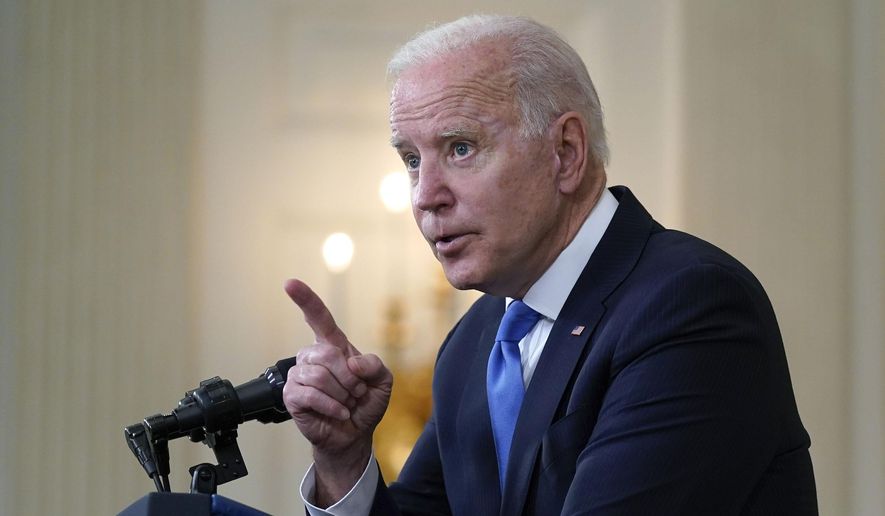The Pentagon will be late presenting a formal budget for fiscal year 2022, prompting some Republican lawmakers Wednesday to note the difficulty of holding a hearing on how much money the Army needs to keep the lights on.
With President Biden’s spending choices on defense being watched closely by partisans on both ends of the political spectrum, California Rep. Ken Calvert, ranking Republican on the House Appropriations defense subcommittee, accused the White House of “dragging its feet” on providing the budget for lawmakers to review.
“This delay is very concerning to me. It increases the risk of a continuing resolution that nobody would like to have,” the California representative warned.
Mr. Biden had indicated he intends to request $715 billion for the Department of Defense, the first Pentagon budget for him and Secretary of Defense Lloyd Austin. The amount is slightly higher than the $704 billion for this year but would actually be a decrease in real terms compared to President Trump’s budgets.
Republicans on Capitol Hill have been pushing for a real increase in the defense budget, which they say is necessary to keep up with the threats from increasingly aggressive competitors like China and Russia.
“Without a net 3% to 5% percent funding growth, the Army would face difficult choices,” Mr. Calvert said.
Rep. Hal Rogers, Kentucky Republican, expressed annoyance that the White House has yet to send over the actual budget and that the preliminary figure would amount to a cut for the Pentagon.
“Can you manage the confrontations we are facing around the world with less than you had this year?” he asked Acting Army Secretary John E. Whitley and Army Chief of Staff Gen. James C. McConville, who testified at the budget hearing Wednesday.
The Army officials have ambitious plans — nothing less than the complete transformation of the Army, into a fully networked force with an emphasis on cutting edge technology such as hypersonic and directed energy weapons.
“If the Army does not modernize, we will lose overmatch with our peer adversaries. We have made tremendous progress but success is not guaranteed,” Mr. Whitley said.
Through a process it calls “Night Court,” the Army says it regularly combs through the budget looking for ways to save money by eliminating unnecessary programs.
“It is prioritizing and making sure we are putting our dollars toward our highest priorities — people, readiness and modernization,” Mr. Whitley said.
Subcommittee Chairwoman Betty McCollum, Minnesota Democrat, said every member would like to see a formal budget from the White House. But she also noted that Mr. Biden’s team has had to contend with obstacles such as the COVID-19 pandemic, a presidential transition that “did not go smoothly,” and the pro-Trump mob that stormed the Capitol Building in January.
“We need to be mindful that the Trump budget came out on May 23,” she added.
There are about 485,000 active duty troops in the Army and a slightly larger figure in the National Guard and Army Reserves — the same size as on 9/11 20 years ago. Gen. McConville told the subcommittee he would like to see the Army increase to about 550,000.
“I recognize that, quickly frankly, we can’t afford that. We must keep the force we have ready,” Gen. McConville said.
Mr. Whitley noted that risk has been factored into the proposed budget.
“We rebuilt readiness. That was hard. We know that readiness can turn on a dime,” he said. “We realigned resources to fund a lot of the modernization effort. To keep these efforts going, we need to have sustained and predictable funding. You can lose these gains very quickly.”
Rep. Steve Womack, Arkansas Republican, said he was worried that they won’t be pleased with the formal budget when President Biden sends it over.
“It’s going to force us to make some terrible decisions,” he said.
Gen. McConville agreed that tough decisions will have to be made if the Army doesn’t get a workable budget that will allow senior officials to continue with pressing needs to modernize the force.
“We are not going to send young men and women into combat that aren’t trained,” he said. “If the resources are reduced, something has to give. It could be in quality of life for our soldiers and families.”
• Mike Glenn can be reached at mglenn@washingtontimes.com.




Please read our comment policy before commenting.